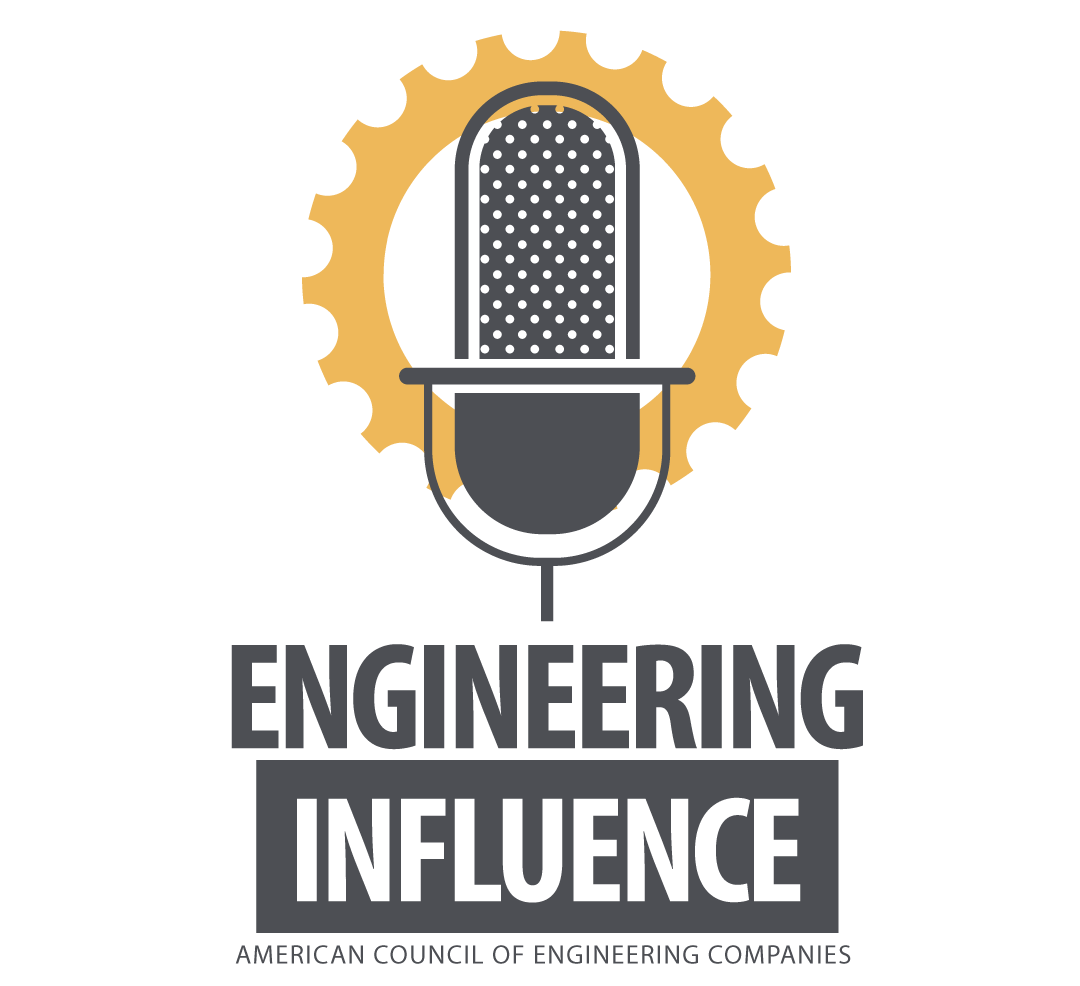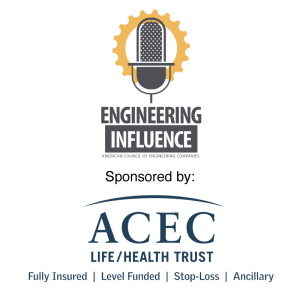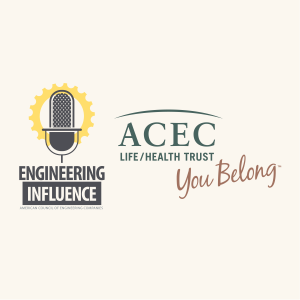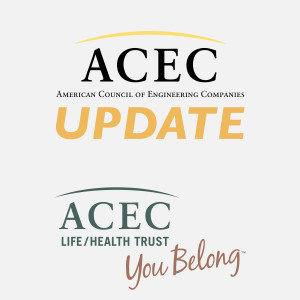
The Voice of the Business of Engineering
Engineering Influence is the official award-winning podcast of the American Council of Engineering Companies (ACEC).
ACEC is the trade association representing America's engineering firms; the businesses that design our built environment. Subscribe to the podcast for a variety of content ranging from interviews with newsmakers and elected officials to in-depth conversations on business trends, the economy, technology and what's next for the engineering and design services industry.
Visit us online at www.acec.org
Follow us on Twitter at @ACEC_National
ACEC reserves the right to moderate episodes on its channel and make editorial decisions on the inclusion or deletion of comments posted by listeners. Direct any questions to comms@acec.org.
Episodes

Monday Aug 08, 2022
The Latest News on the Senate Budget Deal
Monday Aug 08, 2022
Monday Aug 08, 2022
We were joined again by Matt Reiffer, VP of Transportation Programs and Katharine Mottley, VP of Tax and Workforce Policy with the ACEC Advocacy team to provide an update on the progress of the Senate budget deal.

Wednesday Aug 03, 2022
A Closer Look Inside the Senate Budget Deal
Wednesday Aug 03, 2022
Wednesday Aug 03, 2022
We were joined by Matt Reiffer, VP of Transportation Programs and Katharine Mottley, VP of Tax and Workforce Policy at ACEC to take a closer look inside the moving parts of the Senate budget deal that is expected to reach the floor later this week.

Thursday Jul 28, 2022
A Closer Look at the Fed Rate Hike with Economist Ken McGill
Thursday Jul 28, 2022
Thursday Jul 28, 2022
Ken McGill with Rockport Analytics and chief economist for the ACEC Research Institute joined the podcast to discuss the Fed's 75 basis-point interest rate hike and what it means for the economy and the engineering sector.
Host:
Hi there, and welcome to the engineering influence podcast from the American Council of Engineering Companies. I'm Allison Schneider, ACEC's Director of Media Relations, and I'm joined today by Ken McGill of Rockport Analytics to discuss today's announcement that the Fed will once again raise interest rates. Ken also serves as chief economist for the ACEC Research Institute, which provides original research and analysis on topics vital to the business of engineering. Ken, thanks for being here.
Ken McGill:
Thank you, Allison.
Host:
Now let's jump right into it. Today, The Fed announced an interest rate hike of three-quarters of a percentage point. That's the same as they did in June. Now, this is the fourth rate increase in five months. Talk to us about what the Fed is seeing in the economy to take this action.
Ken McGill:
Well, clearly they're focusing on fighting inflation and, I think the CPI reading of 9.1% last month certainly was worrisome for all of us, but the Fed paid very close attention to that. And, that was at least part of the reason for a 75 basis point increase in the fed funds rate. Having said that, they're also aware that the economy — some of the real measures of the economy — are beginning to slow spending and even employment to some extent and some of the high-frequency measures of inflation are actually beginning to fall off of their peaks. So I think that was the reason that many of the analysts that thought we were going to a 100 basis point increase turned out to be incorrect.
Host:
This is of course going to make borrowing money more expensive. How do you see this announcement affecting our members?
Ken McGill:
Yes, absolutely. The increase in borrowing costs is going to hurt many sectors of the economy, construction and housing being one of the more dominant ones and one of the ones that get hit very quickly of course. When we talk about rising borrowing costs, you can think about the housing side that that's certainly going to cut into demand because affordability for mortgage rates alone becomes lower. First-time buyers certainly have more trouble coming into the market.
Ken McGill:
Particularly in the face of the increases in home prices that we've seen. On the other hand, when you think about non-res construction borrowing costs, there are also significant and there are knock-on effects that affect the pricing of materials and labor, as well as, you know, elevated in interest rates begin to permeate through the economy.
Ken McGill:
So, yeah, it's, it's not a good thing for construction. The question really is, um, things will begin to turn negative. Some of the indicators already have, as we all know, it's a question of just really how fast and how far things will fall off. Now for our members, as many of them know, A/E services tends to lead construction activity, and my guess would be that some of the construction indicators that are already beginning to weaken which suggest that they're already seeing in some of their bookings some weakness as well. They'll also lead us into the recovery that we will see as soon as inflation begins to fall off into and get closer to the Fed's target range of 2%.
Host:
You mentioned that target range. The fed has the dual mandate of maximum employment and stable prices. We know the labor market is going strong, but inflation data showed prices soared to 9.1% in June. It seems like with this action, the Fed's trying to walk a tight rope to slow inflation without increasing unemployment. Can you talk about that a little bit?
Ken McGill:
Absolutely. Their dual mandate — and it is a tight rope. When you think about the fact that those two things can actually be inversely related. Said differently, you know, fighting inflation with either increasing interest rates or going through quantitative tightening, which they're also doing right now, that slows economic activity. That's the point of raising those rates and the finesse part of it on the part of Chairman Powell and the rest of the Fed governors is just how quickly to attack inflation with rising rates or quantitative tightening such that the damage to the real side of the economy, employment and spending in particular is as small or as inconsequential as possible. It's a tight rope. And that's why analysts are constantly arguing about the difference between a rate increase of 50 basis points versus 75 versus a hundred. Those numbers sound fairly small, but they have huge implications for the real side of the economy.
Host:
With the way things are headed, there's been talk of a recession. Nouriel Roubini, the economist who predicted the 2008 crash, said "The idea that this is going to be short and shallow is totally delusional." His warnings go against, we should say, other predictions on Wall Street for a mild recession, including those from Goldman Sachs and Morgan Stanley. The Biden administration is reluctant to say a recession is on the way. What are your thoughts there?
Ken McGill:
I tend to lean towards the consensus that sees frankly, a recession coming, probably early in 2023 will be the start. But I also agree that it should be mild. And part of that, that logic is really taking a look at the real side of the economy right now. Employment, as you noted, is, has been very strong and should continue to be that way in particular, particularly because we've seen strength in manufacturing. But we're also seeing a lot of strength in service employment, be it leisure and hospitality or professional and business services. That's where the job strength has been these last 6, 8, 9 months. And that bodes well for consumer spending and confidence moving forward. So when you take a look at that, it's hard to imagine that consumption will fall off the edge of a cliff. It's hard to imagine that business investment — which lags that and follows it in the economic cycle — that it will completely dry up.
Ken McGill:
We've seen, inflation indicators, as I mentioned before, already beginning to suggest that we've seen a peak and things are starting to cool down. That will raise well, that will slow any losses in real income that consumers are seeing by the fact that if inflation is sort of eating away at their paycheck. Wages are still rising at a rate slower than, let's say ,the beginning of this year, but they're still rising. And if the Fed is successful in pushing, beginning to push inflation down, real wages will turn positive as well. And that bodes well for spending in the future. So I'd look at the real side of the economy and it's just, it looks strong enough to weather these fed actions. And if it does get pushed into a recession, it will be a mild one.
Host:
You talked about weathering these Fed actions. There's been talk that they will continue to raise interest rates through the end of the year. Do you have any preview on what we should be looking for or what we might expect?
Ken McGill:
Well, you know, we all tend to watch the same indicators that the Fed governors do. And, those indicators are suggesting, as I said, a slow down a cool off period, if you will. And in our minds, in our team anyway, we've looked at it and thought, "Okay, the fed will raise again in September and end November, frankly." And, but those, those increases will be slower. They'll be smaller. Maybe we'll see a Fed funds rate of maybe 4% by the end of the year. So, you know, whether they, they do a lot of that change from the two, two and a quarter, two and a half percent that we are now, to that 4% could happen, could be front loaded in other words. It's a function of watching those indicators and of course the monthly and weekly indicators of inflation. They'll probably stop in raising rates at the end of this year because the economy will have slowed enough and inflation will cooled enough to convince them that they should probably remain neutral for a while. If we do head down into a mild recession, maybe even more modest recession, they may actually start to loosen. Again, some analysts out there are calling for by the end of 2023, a hundred basis point decline in the Fed funds rate. So, you know, they're definitely watching inflation and watching the potential for a recession. And I think they'll adjust rate increases and eventually decreases accordingly.
Host:
Those are really great insights. Is there anything else you think our members should be aware of?
Ken McGill:
Well, I, I think I would strongly suggest that everyone keep an eye on the pandemic. In other words, there are non-economic risks out there to, to the outlook, both for inflation and for the potential for a recession. The pandemic is not over it's. You know, we're starting to see some of these variants take hold again. I think we still have these geopolitical challenges like the war Ukraine, and the fallout from that war — that could impact a lot of the thinking behind the Fed and the actual results that we see in economic growth and inflation. And finally, you know, watch those commodity prices. Everyone seems to watch oil prices or at least gasoline prices on a daily basis. We're already seeing them fall. I'm sure everyone's noticed that the price at the pump is down about 50 cents per gallon over the last, few months — actually a few weeks — and commodity prices are also starting to fall. That's good news for construction materials and supplies. It's also good news on the inflation front in general. So watch those non-economic factors that are out there, geopolitical risks and, and the pandemic itself. And then keep an eye on, on, commodity prices. I think they're a good indicator of, of where things are going for inflation in the near term.
Host:
Ken, thanks as always for your insights. There's a lot to watch here. So I have a feeling you'll be joining us again soon. This has been another installment of ACEC's engineering influence podcast. Thanks to our guest, Ken McGill of Rockport Analytics and chief economist for the ACEC research Institute. I'm Alison Schneider. Thanks for listening.

Friday Jul 22, 2022
Update on the Life Sciences Market with Colliers
Friday Jul 22, 2022
Friday Jul 22, 2022
Diana Alexander, ACEC's Director of Private Market Resources, joined the program to interview Aaron Jodka with Colliers, an international professional services and investment management company, to discuss recent changes to the health care, science + technology market. Aaron participated in our recent Private Market Symposium on this market held in Boston.
ACEC will hold its next symposium on the energy market in Houston, Texas in November. To learn more about this event and to check out all of our Private Market offerings, visit our Private Markets website here.

Thursday Jul 21, 2022
The Economic Report for July 2022
Thursday Jul 21, 2022
Thursday Jul 21, 2022
Welcome to ACEC’s July economic update. Each month, the ACEC team analyzes the latest industry data and provides insights for the engineering and design industry.
Here are the top 4 things you need to know:
Number 1 —
Total design and construction spending was up nearly 10% this May, compared to the same time last year says the U.S. Census Bureau. The category remains driven by private residential spending up 19%. Private non-residential spending is still up, but not as much as previous months coming in up 3.7%). Public spending is now showing a slight decline down 2.7% year-over-year.
Number 2 —
The hottest market in the private, non-residential sector is manufacturing, which is up 23% from the previous year. On the other side, the coolest market is lodging which declined by 20%, based on data that was not seasonally adjusted from the U.S. Census Bureau.
Number 3 —
The possibility of a recession is still looming and labor shortages, supply chain disruptions, and inflation remain top concerns. According to Building Design+Construction industry leaders are worried that they may no longer be able to pass along price increases to their clients. This could result in project delays or firms taking on more financial risk to win work at lower margins.
Number 4 —
One more data point as we look across the business landscape… For the first time in three years startup funding is dropping. Investments in tech startups are at their lowest level since 2019, dropping 23% over the last three months. This is according to figures released earlier this month by PitchBook, which tracks young companies.
There you have it. The economic update series is one of ACEC’s resources for media and members.
For a deeper dive, check out all of ACEC’s popular Private Industry Briefs and ACEC’s full slate of private market offerings at ACEC.org.

Tuesday Jul 19, 2022
A Closer Look at QBS
Tuesday Jul 19, 2022
Tuesday Jul 19, 2022
The podcast welcomed researchers Gordon Kingsley from Georgia Tech and Paul Chinowsky with the University of Colorado, Boulder for a closer look at the ACEC Research Institute's newly released study on Qualifications Based Selection (QBS). You can read the new study and access resources on QBS at ACEC's new QBS Resource Portal.

Monday Jul 18, 2022
Monday Jul 18, 2022
Leo MacLeod, is the author of the new book – from the ground up – stories and lessons from architects and engineers who learned to be leaders. Leo founder of Training. Coaching. Pie., helps Architecture/Engineering/Construction (AEC) firms with coaching, training, and leadership transition. He regularly presents for the American Council of Engineering Companies and helped develop the Oregon chapter’s popular leadership program.
Leo speaks nationally on leadership development, emotional intelligence, and why baking pie is a great way to develop soft skills. With a BA in English with honors from Portland State University, he’s had a successful career as a freelance writer, fundraiser, and advertising executive and consultant. For many years, Leo has written columns for Zweig Letter, Daily Journal of Commerce, and The Business Journal.
Learn more about Leo MacLeod at https://leomacleod.com.

Friday Jul 15, 2022
Project Spotlight: The Kalispell Core and Rail Redevelopment Project
Friday Jul 15, 2022
Friday Jul 15, 2022
Today, we're putting the spotlight on the Kalispell Core and Rail Redevelopment Project - a 2022 EEA National Recognition Award winning project from KLJ Engineering.
In 2010, Kalispell received a Brownfields Area-Wide Planning pilot grant and launched a project to revitalize the Core Area, the City's traditionally industrial-focused hub with a rail corridor stretching across its center. Dubbed the "Core Area Plan", the initiative was unique in its public outreach. The Core Area includes 1,100 parcels of land held by 450 property owners. City staff held one-on-one meetings with one-third of the property owners whose holdings represented 60% of the land in the Core Area. Additionally, public meetings, open house events, and special presentations to community groups were held, and newsletters were produced throughout the process engaging the community at unprecedented levels.
One particularly innovative aspect of the outreach included a five-day workshop soliciting community/business owner feedback, and culminating in “Speeder Car” rides for participating public (video here), offering a unique experience and perspective of the proposed trail, which was followed by surveys.
The Core Area Plan integrated community ideas and priorities, developed a vision, identified infrastructure needs and development limitations due in part to the brownfield sites, and then created specific strategies for revitalization. The City capitalized on the brownfields assessment and revolving loan fund grants paired with Targeted Brownfields Assessments (TBA) to carry out the community vision. In 2015, Kalispell was awarded a US Department of Transportation TIGER grant, further bolstering the effort to transform the City for the next 100 years.





